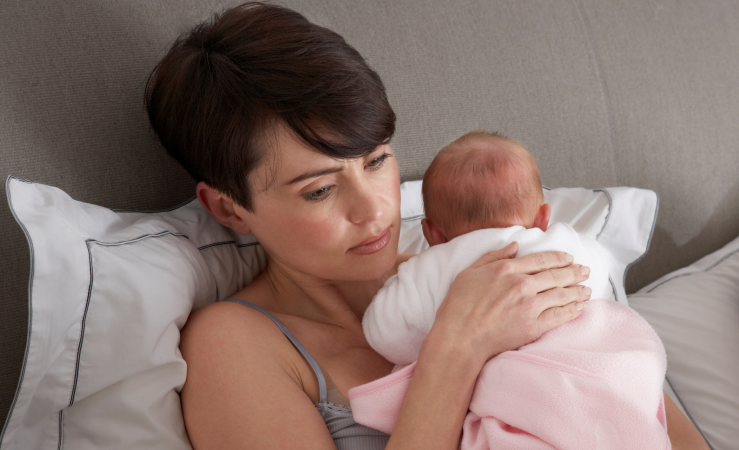September 29, 2023
Postpartum Depression is Driving Maternal Mortality

In what is typically characterized as the highpoint of joy, the birth of a child can also bring feelings of depression for a new mother. And the postpartum depression statistics are sobering.
According to the Centers for Disease Control, about 1 in 8 women nationwide experience symptoms of postpartum depression. In Iowa, the postpartum depression statistics are higher, with approximately 1 in 7 women self-reporting depressive symptoms after giving birth. And women are dying because of it.
“It's such an awful tragic statistic to even have to think about, but it's one of the things that is very real in Iowa and in central Iowa. We need to talk about those adverse outcomes to be able to make any sort of difference.”
Postpartum depression is the leading cause of maternal mortality — 23% of pregnancy-related deaths, including suicide, are related to a mental health crisis. Jen Groves, EveryStep vice president of community health services, says addressing the issue extends past the first post-delivery check-up. “What we're finding now is that some of the worst health outcomes occur for folks up to a year after delivery. So really looking at that expanded postpartum period, it's going to be something that's essential when we're talking about successful births and maternal health outcomes.”
Postpartum depression statistics compiled by the CDC begin to paint a picture of those most likely to experience the condition. Among pregnancy-related deaths:
- 82% of those who died lived in urban counties.
- The highest percentage (34.8%) were non-Hispanic white persons, followed by 24.1% Hispanic.
- 84% of the deaths were determined to have been preventable.
- The highest percentage of deaths (30%) occurred 43-365 days postpartum.
“It's such an awful tragic statistic to even have to think about, but it's one of the things that is very real in Iowa and in central Iowa,” says Groves. “We need to talk about those adverse outcomes to be able to make any sort of difference.”
Many women experience worry, sadness and tiredness after having a baby, a condition often referred to as “baby blues” and these symptoms typically resolve on their own within a few days. Postpartum depression symptoms, however, are more intense and last longer. These symptoms of postpartum depression include:
- Crying more often than usual.
- Feelings of anger.
- Withdrawing from loved ones.
- Feeling numb or disconnected from your baby.
- Worrying that you will hurt the baby.
- Feeling guilty about not being a good mom or doubting your ability to care for the baby.
The postpartum depression statistics are unsettling, but depression is treatable, and people get better with treatment. The first step is talking to your health care provider about what you’re experiencing. But according to Groves, that first step seems out of reach for some new parents. “One of the critical barriers to maternal health care, especially in the postpartum period, is access to medical insurance.”
Learn About EveryStep's Work in the Community
That’s where EveryStep is making a difference. Through EveryStep’s Title V grant, EveryStep can provide presumptive eligibility for Medicaid. Pregnancy is one of the conditions that allows immediate access to full Medicaid benefits, while the rest of the Medicaid application is being processed.
“While the rest of the system figures out if long-term Medicaid is going to be an option, not only do we provide that immediate service and Medicaid eligibility, but presumptive Medicaid has much different funding levels than traditional Medicaid,” says Groves.
For instance, traditional Medicaid would be offered at 133% of the federal poverty level, which means a family of three can earn no more than $33,000 a year. With pregnancy and the presumptive eligibility, it’s 375% of the federal poverty level, which means a family of three can earn up to $93,000 a year and still be eligible.” Groves says many families are not aware of the higher income limit for pregnancy, and EveryStep works to get the word out to as many families as possible. “We have so many folks that we work with that say, ‘well, we don't qualify for Medicaid,’ but when you're pregnant and having that almost triple eligibility criteria, it will cover so many.”
Connect with EveryStep
While presumptive eligibility for pregnancy is a win for prenatal health and birth, the coverage only lasts for six weeks postpartum if a family is determined not to be eligible for the full range of Medicaid benefits. This means at the time an individual is most at risk for postpartum depression, they may not have affordable access to health care. Groves says the Iowa Legislature has introduced several bills expanding the postpartum period to 12 months, but to date, none of the bills have made it to the governor’s desk.
The National Maternal Mental Health Hotline is free and available 24/7 for pregnant and new moms in English and Spanish. Call or text 1-833-TLC-MAMA (1-833-852-).
We all face challenges, but some people in our community are coping with more difficult circumstances. EveryStep shows up when people need us most, no matter who they are or what circumstances they face.
The diversity of EveryStep’s programs helps meet a variety of needs at once, and ongoing support over time. You have the power to help those who are struggling in our community.
Together, donors like you can help build a caring, connected community that surrounds children and adults with comfort, dignity and hope — but also practical solutions and a renewed capacity for self-determination. Your support for parents impacts the whole community.
If you or someone you know is struggling to find the support they need, please contact EveryStep at 515-558-9946 or complete the commitment-free, confidential “Find Care” form on EveryStep’s website at www.everystep.org/find-care. EveryStep staff will follow up with a phone call to answer your questions and help.